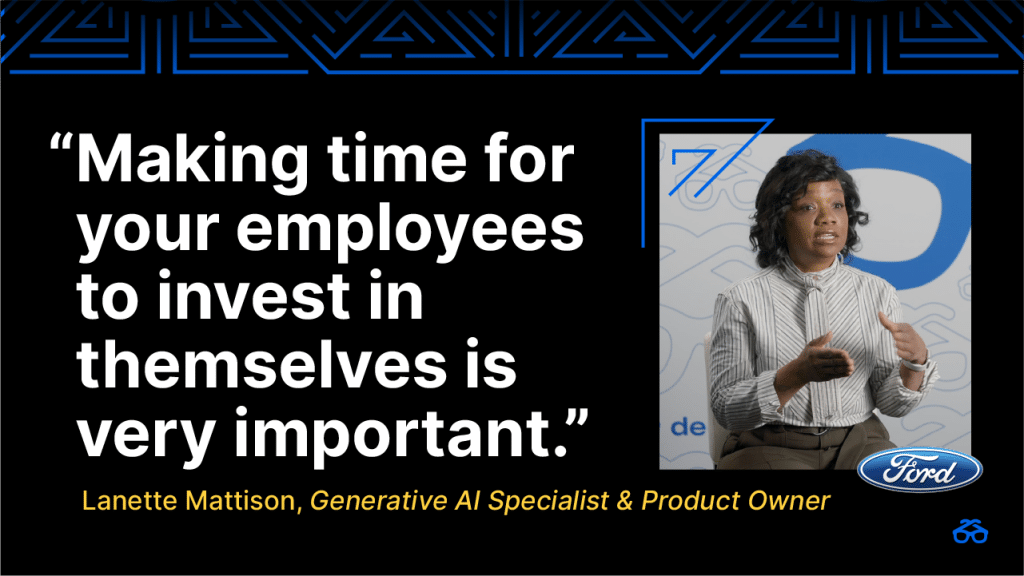Lanette Mattison is spearheading the expansion of AI at the Ford Motor Company Customer Service Division. What’s perhaps even cooler is she put herself in that rarefied place. And she did it through self-directed upskilling.
It’s the kind of story L&D pros live for. And the kind of story any employee can use for inspiration—and as a roadmap for getting ahead.
“I’m very strategic, and I’m a lifelong learner,” Mattison told us when we first met her in 2023 at Degreed LENS, our annual flagship conference.
Mattison had just won our inaugural David Blake Learner of the Year Award, and we listened somewhat awestruck as she explained how using our platform propelled her from a Ford manufacturing IT role she’d held for years to a new job as a Product Owner in Connected Vehicle Enterprise Analytics. That new role focused on providing enhanced keyword search capabilities to Ford technicians poring through documentation they rely on to complete repairs.
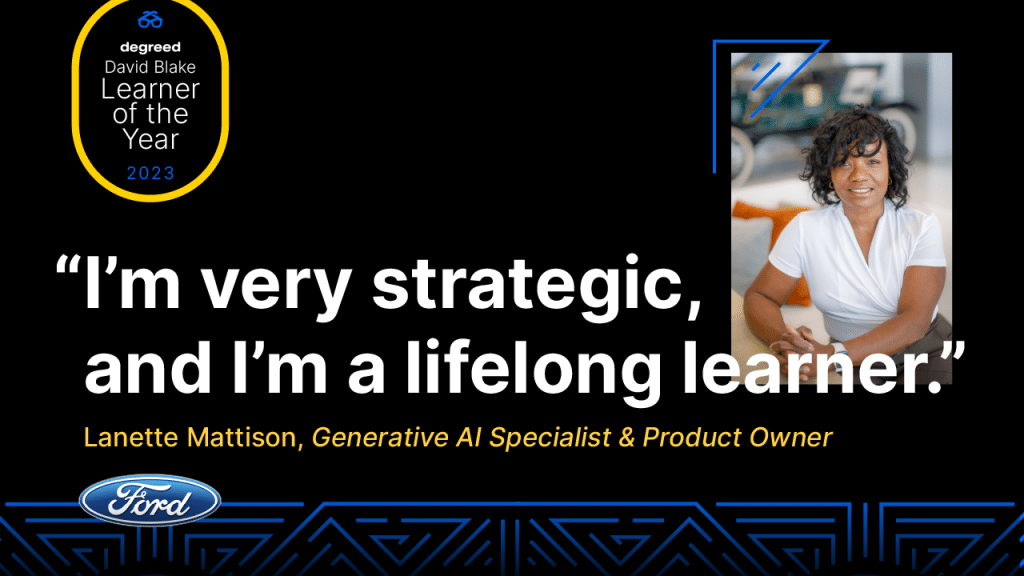
As learning leaders at the auto giant noted, “the interviewing team was extremely impressed with the drive, determination, and passion she demonstrated in her efforts to prepare for the position. Her clear understanding of the role, responsibilities, and expectations, as well as the skills she developed through learning in Degreed, sealed the deal.”
Mattison’s skill-building journey even caught the attention of Ford CEO Jim Farley, who celebrated her on social media, linking to a video the company made about her determined investment in herself. “It’s never too late to learn something new, and I love seeing our employees hold themselves to the highest standard in the pursuit for excellence.”
Returning to LENS to Pass the Torch
Following last year’s LENS, Mattison earned yet another promotion—to Generative AI Specialist & Product Owner in the company’s Customer Service Division. In this new role, she’s developing even more advanced technology tools for repairing vehicles.
Join us to explore this and more with Mattison below in our new Q&A.
And join us for LENS on March 5 and 6 in Houston or online. We’re thrilled to be welcoming Mattison to the event once again as she presents this year’s Learner of the Year Award to a still-unannounced recipient. If our Q&A here is any indication, LENS attendees better get ready for some serious inspiration.
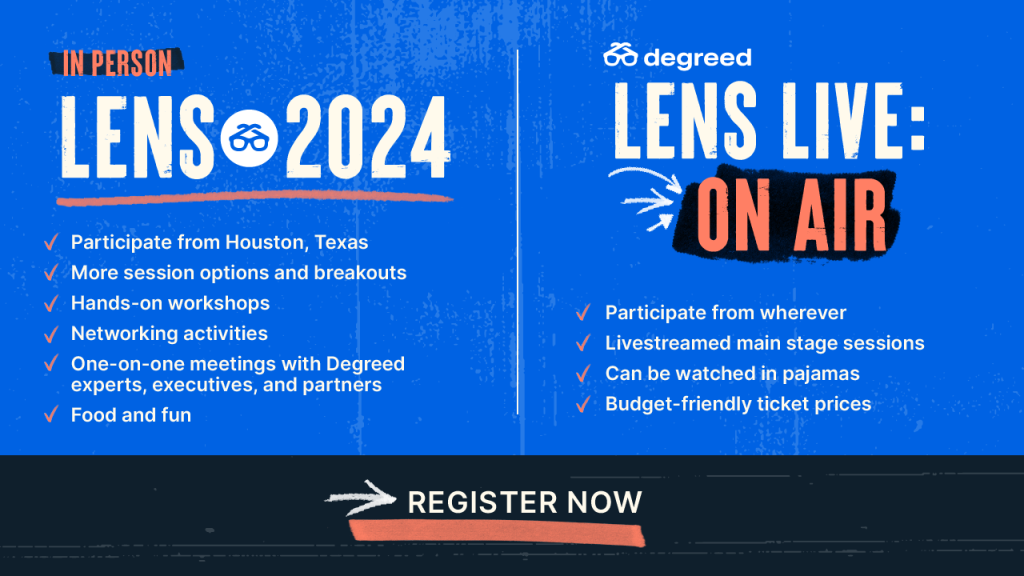
Degreed: Your upskilling journey has been remarkable. How did it get started?
Mattison: I had worked for years at Ford in manufacturing IT, in a role that was largely focused on systems that support production processes—essentially getting vehicles built efficiently. I wanted to do something different. I had been in the same job for quite some time.
I wanted to get out of my comfort zone. I wanted to go someplace that took technology to the next level. I was fascinated with artificial intelligence, data insights, and analytics. I knew that I needed to make myself more marketable.
I set my sights on becoming a product owner in data analytics, a role in which I could oversee the development of new systems and processes for the larger business, beyond the manufacturing plant. But to get there, I needed to upskill.
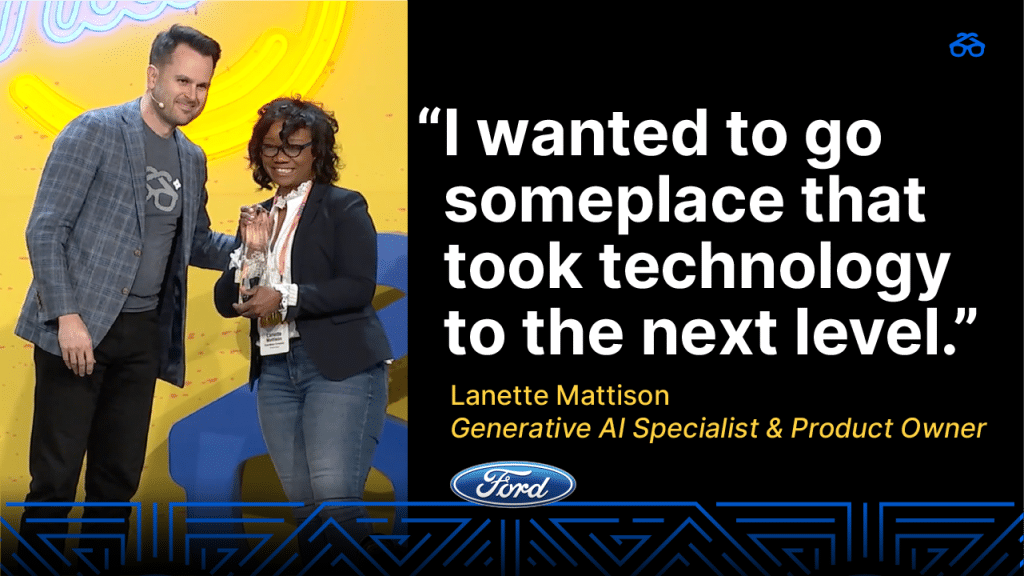
Degreed: What happened next?
Mattison: I started researching roles in the Ford database, and I found a SharePoint site that outlined the product owner role. That site directed me to curated learning resources in Degreed. I found everything I could possibly need to learn all of the skills and proficiencies I needed to become a successful product owner.
One big element was I didn’t have much hands-on experience working with agile processes. I was familiar with the agile project management tool used by Ford, and I had some understanding of user stories, but I definitely needed to expand my knowledge of agile practices.
Using Degreed, I was able to gauge my current skills and identify gaps, which allowed me to prioritize my development to match what I needed for the role I was pursuing. I worked my way through each pathway in the plan, building a strong foundation in power skills needed by product owners at Ford. I also used the search function in Degreed to locate more content—on topics like artificial intelligence—to supplement my knowledge and explore other skills and principles that could boost my qualifications.
Degreed: Your efforts paid off. You got the product owner job. But the story doesn’t end there, does it?
Mattison: It doesn’t, I’m happy to say. Shortly after receiving the award from Degreed last year, I got promoted to my current role in AI. If a Ford vehicle technician can’t find what’s needed to fix a vehicle, the job goes up a level to a Ford field service engineer. These engineers have access to a broader database of information the technicians aren’t privy to. And they need to go through several disjointed systems to figure out how to repair vehicles. So, the question becomes, how can we use large language models to give those engineers search capability in one spot, so that they’re not going to different systems to look for what they need? It basically helps make processes faster.
Degreed: You’ve obviously enjoyed using Degreed. What do you especially appreciate about it?
Mattison: Degreed met me where I was at. It was very accessible, and I could use it just about anywhere. I didn’t have to be at work to do it. I could use it on my phone. I even used it in my car, using the app on my phone to listen to recordings and content as I was traveling back and forth to work.
I love the assessments—to help me identify where I am, identify where I want to go, and then how I can get there.
Degreed is powerful. It is a powerful tool. When I went to school, I used to have to go to the library to find learning materials. I love that Degreed meets me where I’m at.
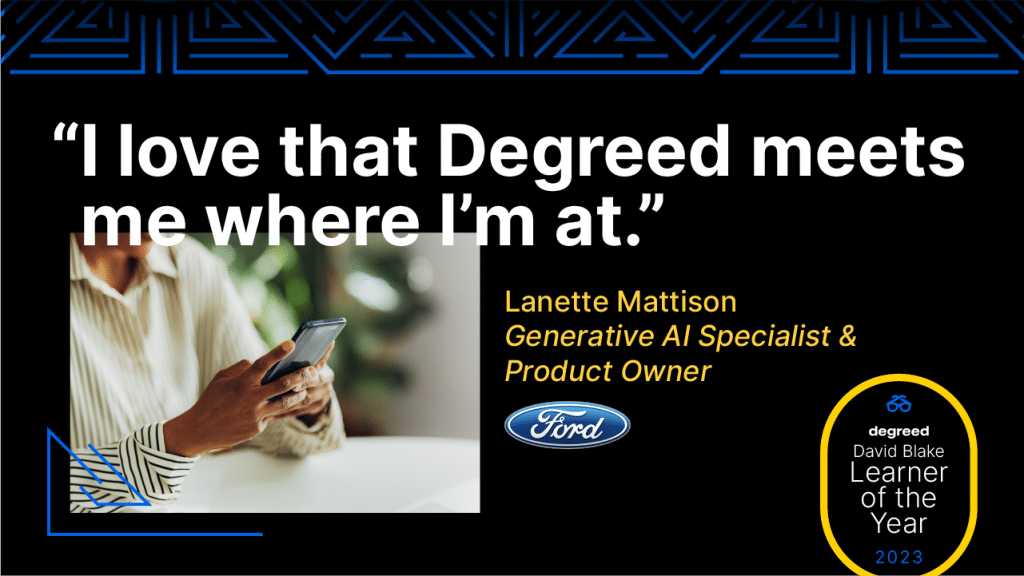
Degreed: Ford did more than connect you with the learning content you used to build new skills. What other ways does the company support learning?
Mattison: I’m very grateful to Ford. We’ve been trained by our L&D team on how to use Degreed. And Ford gives us Friday afternoons as a “power up” time. I use that opportunity specifically for learning.
Degreed: You’ll be presenting our 2024 David Blake Learner of the Year Award at LENS soon. What do you plan to say? Any thoughts for the next recipient?
Mattison: This year has been such an amazing journey. I want to stress how important it is to invest in yourself by upskilling.
I want to tell the person who’s going to be the new Learner of the Year that it’s going to be a whirlwind, so enjoy the ride. But then there’s also a responsibility on your part to share your story. It was nice to be recognized but, once I was, it opened the door for so many people to reach out to me. It was hard at first because, you know, I have work, but I still felt like I had a responsibility to talk to those people and share how I did it, because they wanted to know. It’s about who you can help.
People are going to want to know you. Be open to that. It’s part of the journey.
Degreed: What’s your advice to learners? What can they take away from your story?
Mattison: Reach out to Learning & Development to get help. And you have to have a passion. I have a passion for learning, and I say go for what motivates you. You have to have motivation. Try to put that motivation in front of you and just keep working toward it. Work towards it every single day.
In addition, I’ve embraced an ecosystem of people—HR, Learning & Development, my team—to help me through anything in my career.
Learning is a marathon. It really is a lifelong journey. You have to embrace that seriously. If you want to evolve, if you want to grow in your career, you have to embrace that lifelong learning mindset because things change. They change a lot, and if you want to grow, you’ve got to be willing to learn something new, come out of your comfort zone, and take the next step.
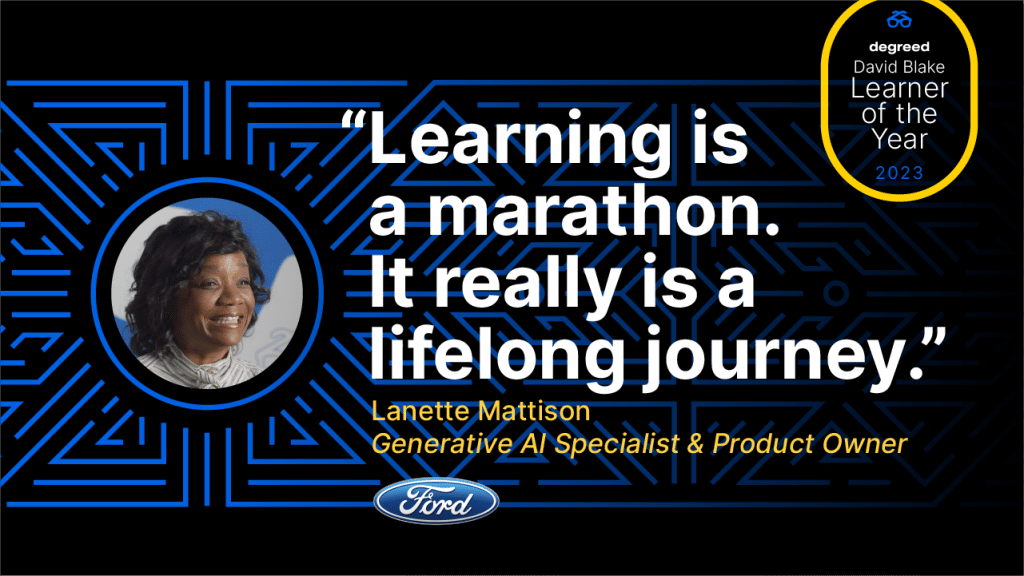
Degreed: What about L&D professionals? What can they take away from your story?
Mattison: Making time for your employees to invest in themselves is very important. It will benefit your company.
I’m a busy person. Being able to have learning at my fingertips was so important. It makes it a lot easier for people to want to learn and then do it. Give people the opportunity and make it flexible so that they can fit it into their lives. That’s most important. A lot of people want to learn but don’t have the time to do it. They don’t see how they can do it.
I’ve had a lot of questions about that. How did you do it? How were you able to do it?
Learning is not one-size-fits-all. Giving people the flexibility to learn at their own pace, to learn when they can, wherever they can, is helping them to be successful.
